Police and Crime: Is Corruption Necessary in Police Work?
VerifiedAdded on 2023/06/07
|10
|2948
|222
Essay
AI Summary
This essay delves into the multifaceted issue of police corruption, critically examining the statement that it is a necessary and unavoidable aspect of police work. The essay begins by defining police corruption and establishing its significance, highlighting the erosion of public trust and the detrimental effects on the criminal justice system. It then explores various arguments, supported by scholarly research, that challenge the notion that corruption is necessary. The essay discusses how corruption contributes to miscarriages of justice, fosters criminal activity, undermines the relationship between the police and the community, and diverts public resources. It also addresses the spread of a culture of corruption and its negative impacts on service delivery. The analysis further examines the consequences of corruption, including victimization, and the decline in public trust. The essay concludes by summarizing the direct and indirect impacts of police corruption, emphasizing the reasons why it should be considered avoidable and highlighting the need for integrity and ethical practices within law enforcement.
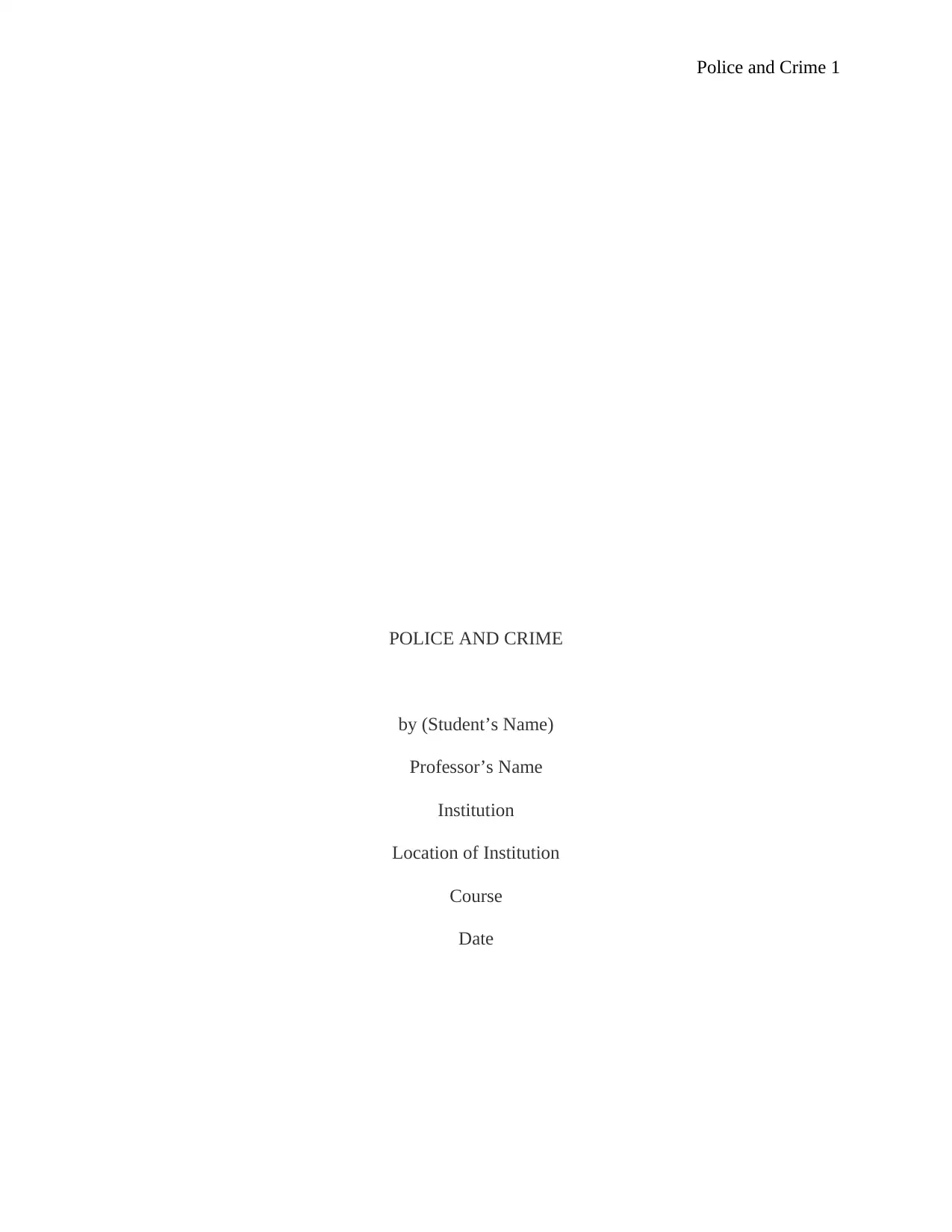
Police and Crime 1
POLICE AND CRIME
by (Student’s Name)
Professor’s Name
Institution
Location of Institution
Course
Date
POLICE AND CRIME
by (Student’s Name)
Professor’s Name
Institution
Location of Institution
Course
Date
Paraphrase This Document
Need a fresh take? Get an instant paraphrase of this document with our AI Paraphraser
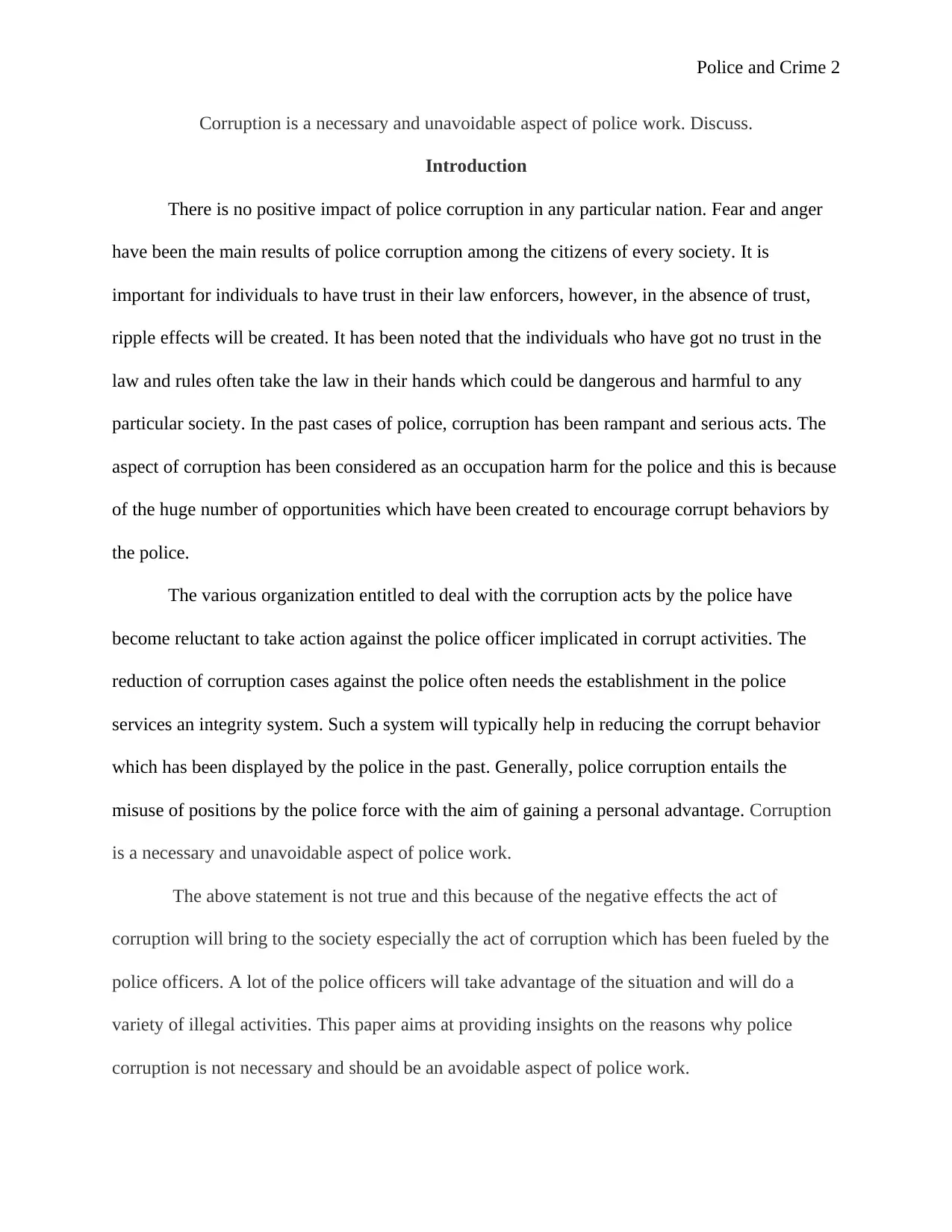
Police and Crime 2
Corruption is a necessary and unavoidable aspect of police work. Discuss.
Introduction
There is no positive impact of police corruption in any particular nation. Fear and anger
have been the main results of police corruption among the citizens of every society. It is
important for individuals to have trust in their law enforcers, however, in the absence of trust,
ripple effects will be created. It has been noted that the individuals who have got no trust in the
law and rules often take the law in their hands which could be dangerous and harmful to any
particular society. In the past cases of police, corruption has been rampant and serious acts. The
aspect of corruption has been considered as an occupation harm for the police and this is because
of the huge number of opportunities which have been created to encourage corrupt behaviors by
the police.
The various organization entitled to deal with the corruption acts by the police have
become reluctant to take action against the police officer implicated in corrupt activities. The
reduction of corruption cases against the police often needs the establishment in the police
services an integrity system. Such a system will typically help in reducing the corrupt behavior
which has been displayed by the police in the past. Generally, police corruption entails the
misuse of positions by the police force with the aim of gaining a personal advantage. Corruption
is a necessary and unavoidable aspect of police work.
The above statement is not true and this because of the negative effects the act of
corruption will bring to the society especially the act of corruption which has been fueled by the
police officers. A lot of the police officers will take advantage of the situation and will do a
variety of illegal activities. This paper aims at providing insights on the reasons why police
corruption is not necessary and should be an avoidable aspect of police work.
Corruption is a necessary and unavoidable aspect of police work. Discuss.
Introduction
There is no positive impact of police corruption in any particular nation. Fear and anger
have been the main results of police corruption among the citizens of every society. It is
important for individuals to have trust in their law enforcers, however, in the absence of trust,
ripple effects will be created. It has been noted that the individuals who have got no trust in the
law and rules often take the law in their hands which could be dangerous and harmful to any
particular society. In the past cases of police, corruption has been rampant and serious acts. The
aspect of corruption has been considered as an occupation harm for the police and this is because
of the huge number of opportunities which have been created to encourage corrupt behaviors by
the police.
The various organization entitled to deal with the corruption acts by the police have
become reluctant to take action against the police officer implicated in corrupt activities. The
reduction of corruption cases against the police often needs the establishment in the police
services an integrity system. Such a system will typically help in reducing the corrupt behavior
which has been displayed by the police in the past. Generally, police corruption entails the
misuse of positions by the police force with the aim of gaining a personal advantage. Corruption
is a necessary and unavoidable aspect of police work.
The above statement is not true and this because of the negative effects the act of
corruption will bring to the society especially the act of corruption which has been fueled by the
police officers. A lot of the police officers will take advantage of the situation and will do a
variety of illegal activities. This paper aims at providing insights on the reasons why police
corruption is not necessary and should be an avoidable aspect of police work.
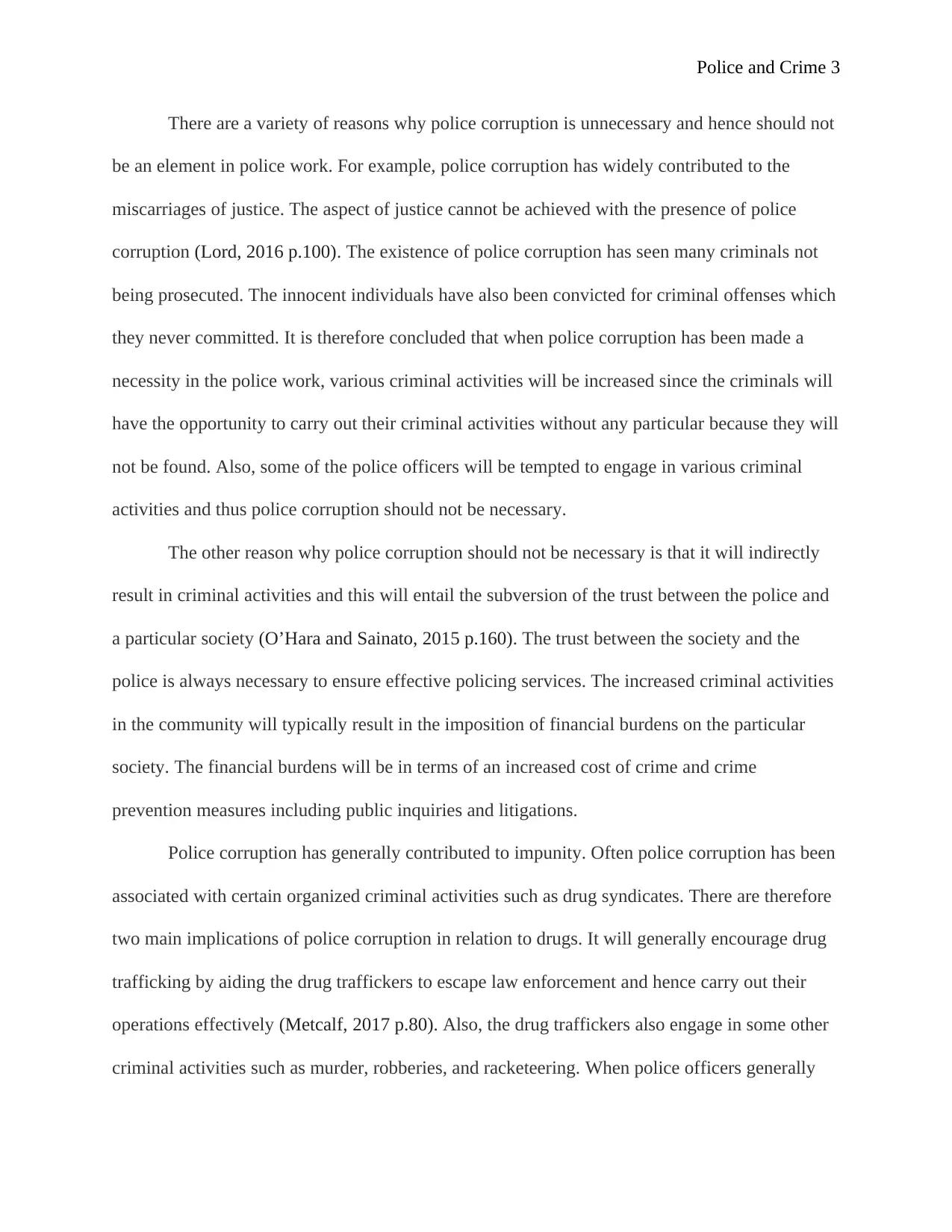
Police and Crime 3
There are a variety of reasons why police corruption is unnecessary and hence should not
be an element in police work. For example, police corruption has widely contributed to the
miscarriages of justice. The aspect of justice cannot be achieved with the presence of police
corruption (Lord, 2016 p.100). The existence of police corruption has seen many criminals not
being prosecuted. The innocent individuals have also been convicted for criminal offenses which
they never committed. It is therefore concluded that when police corruption has been made a
necessity in the police work, various criminal activities will be increased since the criminals will
have the opportunity to carry out their criminal activities without any particular because they will
not be found. Also, some of the police officers will be tempted to engage in various criminal
activities and thus police corruption should not be necessary.
The other reason why police corruption should not be necessary is that it will indirectly
result in criminal activities and this will entail the subversion of the trust between the police and
a particular society (O’Hara and Sainato, 2015 p.160). The trust between the society and the
police is always necessary to ensure effective policing services. The increased criminal activities
in the community will typically result in the imposition of financial burdens on the particular
society. The financial burdens will be in terms of an increased cost of crime and crime
prevention measures including public inquiries and litigations.
Police corruption has generally contributed to impunity. Often police corruption has been
associated with certain organized criminal activities such as drug syndicates. There are therefore
two main implications of police corruption in relation to drugs. It will generally encourage drug
trafficking by aiding the drug traffickers to escape law enforcement and hence carry out their
operations effectively (Metcalf, 2017 p.80). Also, the drug traffickers also engage in some other
criminal activities such as murder, robberies, and racketeering. When police officers generally
There are a variety of reasons why police corruption is unnecessary and hence should not
be an element in police work. For example, police corruption has widely contributed to the
miscarriages of justice. The aspect of justice cannot be achieved with the presence of police
corruption (Lord, 2016 p.100). The existence of police corruption has seen many criminals not
being prosecuted. The innocent individuals have also been convicted for criminal offenses which
they never committed. It is therefore concluded that when police corruption has been made a
necessity in the police work, various criminal activities will be increased since the criminals will
have the opportunity to carry out their criminal activities without any particular because they will
not be found. Also, some of the police officers will be tempted to engage in various criminal
activities and thus police corruption should not be necessary.
The other reason why police corruption should not be necessary is that it will indirectly
result in criminal activities and this will entail the subversion of the trust between the police and
a particular society (O’Hara and Sainato, 2015 p.160). The trust between the society and the
police is always necessary to ensure effective policing services. The increased criminal activities
in the community will typically result in the imposition of financial burdens on the particular
society. The financial burdens will be in terms of an increased cost of crime and crime
prevention measures including public inquiries and litigations.
Police corruption has generally contributed to impunity. Often police corruption has been
associated with certain organized criminal activities such as drug syndicates. There are therefore
two main implications of police corruption in relation to drugs. It will generally encourage drug
trafficking by aiding the drug traffickers to escape law enforcement and hence carry out their
operations effectively (Metcalf, 2017 p.80). Also, the drug traffickers also engage in some other
criminal activities such as murder, robberies, and racketeering. When police officers generally
⊘ This is a preview!⊘
Do you want full access?
Subscribe today to unlock all pages.

Trusted by 1+ million students worldwide
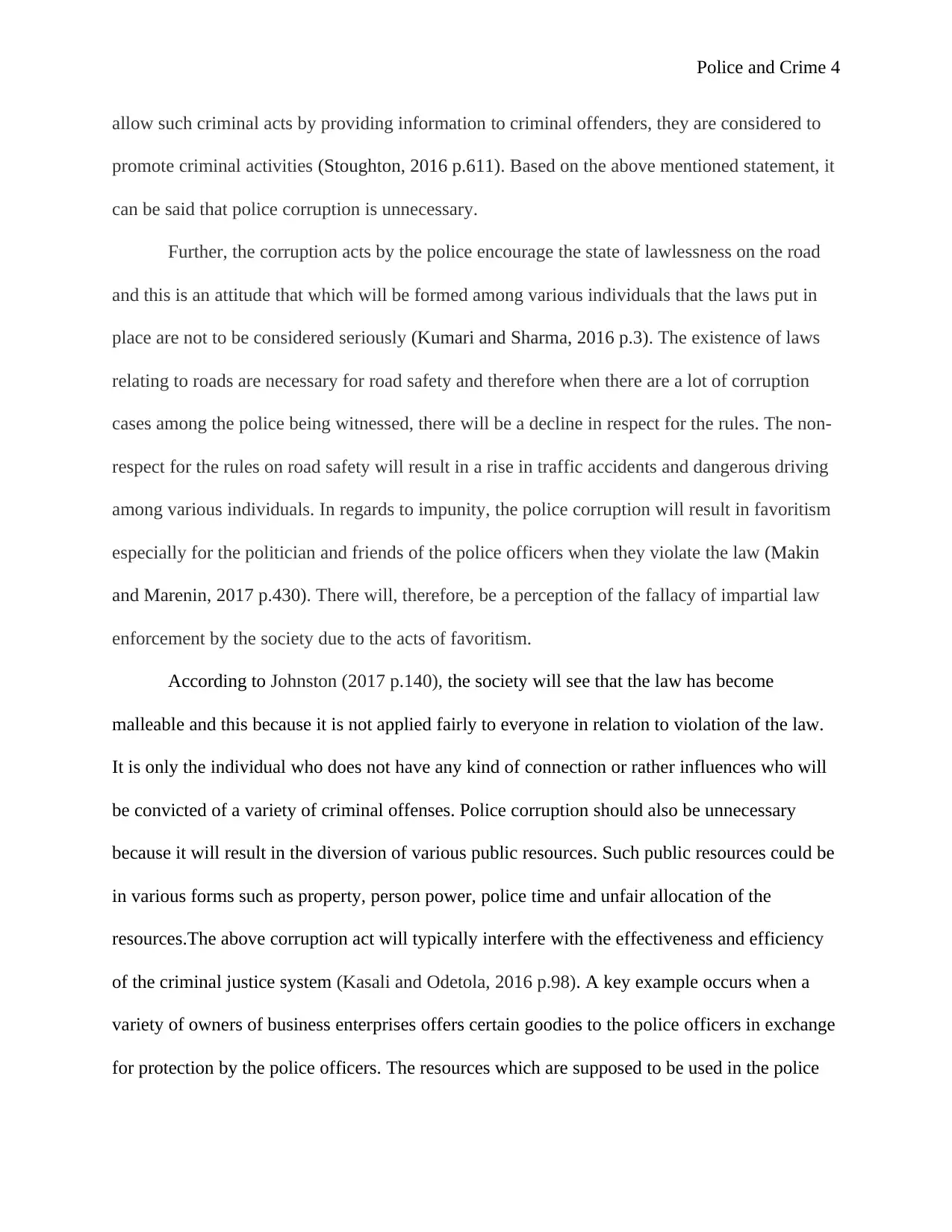
Police and Crime 4
allow such criminal acts by providing information to criminal offenders, they are considered to
promote criminal activities (Stoughton, 2016 p.611). Based on the above mentioned statement, it
can be said that police corruption is unnecessary.
Further, the corruption acts by the police encourage the state of lawlessness on the road
and this is an attitude that which will be formed among various individuals that the laws put in
place are not to be considered seriously (Kumari and Sharma, 2016 p.3). The existence of laws
relating to roads are necessary for road safety and therefore when there are a lot of corruption
cases among the police being witnessed, there will be a decline in respect for the rules. The non-
respect for the rules on road safety will result in a rise in traffic accidents and dangerous driving
among various individuals. In regards to impunity, the police corruption will result in favoritism
especially for the politician and friends of the police officers when they violate the law (Makin
and Marenin, 2017 p.430). There will, therefore, be a perception of the fallacy of impartial law
enforcement by the society due to the acts of favoritism.
According to Johnston (2017 p.140), the society will see that the law has become
malleable and this because it is not applied fairly to everyone in relation to violation of the law.
It is only the individual who does not have any kind of connection or rather influences who will
be convicted of a variety of criminal offenses. Police corruption should also be unnecessary
because it will result in the diversion of various public resources. Such public resources could be
in various forms such as property, person power, police time and unfair allocation of the
resources.The above corruption act will typically interfere with the effectiveness and efficiency
of the criminal justice system (Kasali and Odetola, 2016 p.98). A key example occurs when a
variety of owners of business enterprises offers certain goodies to the police officers in exchange
for protection by the police officers. The resources which are supposed to be used in the police
allow such criminal acts by providing information to criminal offenders, they are considered to
promote criminal activities (Stoughton, 2016 p.611). Based on the above mentioned statement, it
can be said that police corruption is unnecessary.
Further, the corruption acts by the police encourage the state of lawlessness on the road
and this is an attitude that which will be formed among various individuals that the laws put in
place are not to be considered seriously (Kumari and Sharma, 2016 p.3). The existence of laws
relating to roads are necessary for road safety and therefore when there are a lot of corruption
cases among the police being witnessed, there will be a decline in respect for the rules. The non-
respect for the rules on road safety will result in a rise in traffic accidents and dangerous driving
among various individuals. In regards to impunity, the police corruption will result in favoritism
especially for the politician and friends of the police officers when they violate the law (Makin
and Marenin, 2017 p.430). There will, therefore, be a perception of the fallacy of impartial law
enforcement by the society due to the acts of favoritism.
According to Johnston (2017 p.140), the society will see that the law has become
malleable and this because it is not applied fairly to everyone in relation to violation of the law.
It is only the individual who does not have any kind of connection or rather influences who will
be convicted of a variety of criminal offenses. Police corruption should also be unnecessary
because it will result in the diversion of various public resources. Such public resources could be
in various forms such as property, person power, police time and unfair allocation of the
resources.The above corruption act will typically interfere with the effectiveness and efficiency
of the criminal justice system (Kasali and Odetola, 2016 p.98). A key example occurs when a
variety of owners of business enterprises offers certain goodies to the police officers in exchange
for protection by the police officers. The resources which are supposed to be used in the police
Paraphrase This Document
Need a fresh take? Get an instant paraphrase of this document with our AI Paraphraser
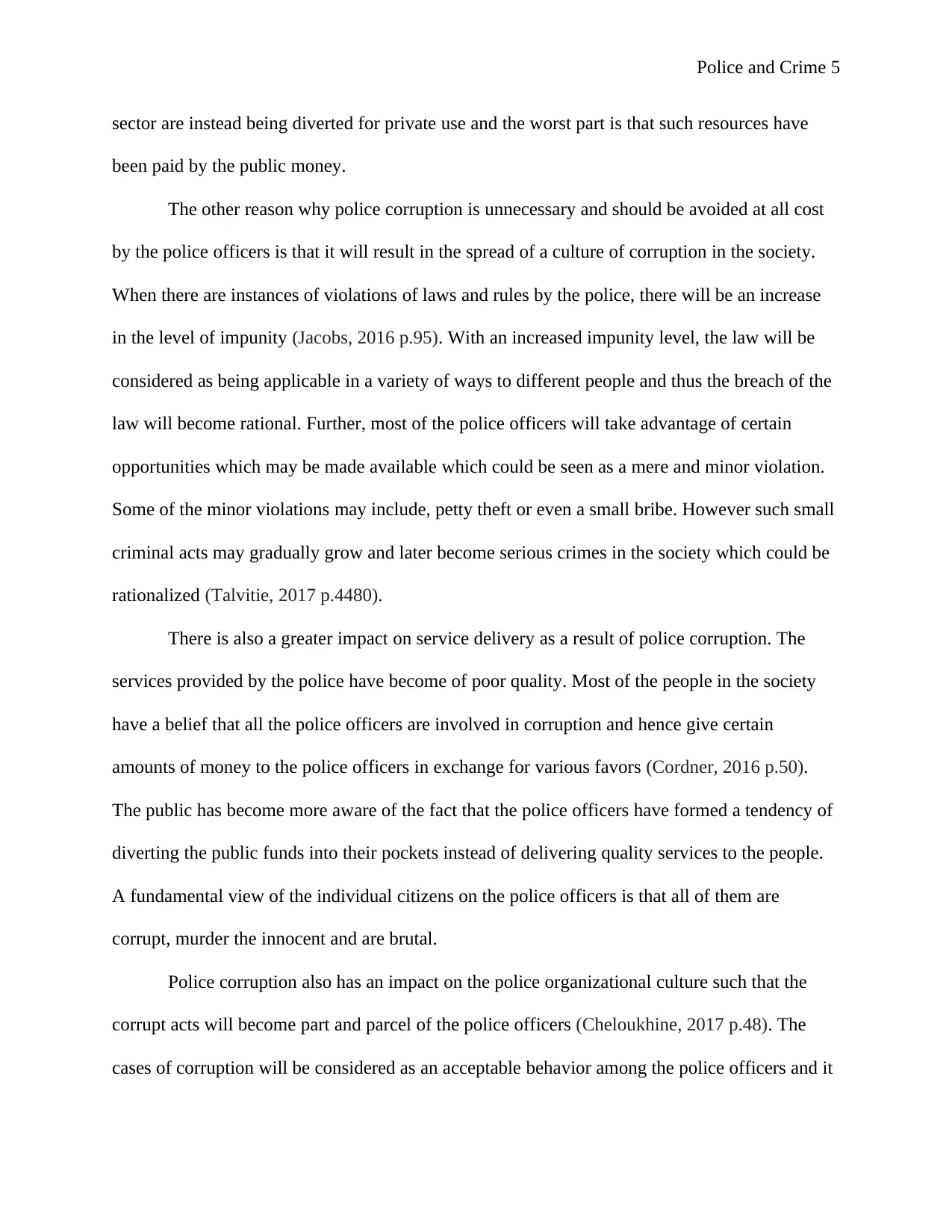
Police and Crime 5
sector are instead being diverted for private use and the worst part is that such resources have
been paid by the public money.
The other reason why police corruption is unnecessary and should be avoided at all cost
by the police officers is that it will result in the spread of a culture of corruption in the society.
When there are instances of violations of laws and rules by the police, there will be an increase
in the level of impunity (Jacobs, 2016 p.95). With an increased impunity level, the law will be
considered as being applicable in a variety of ways to different people and thus the breach of the
law will become rational. Further, most of the police officers will take advantage of certain
opportunities which may be made available which could be seen as a mere and minor violation.
Some of the minor violations may include, petty theft or even a small bribe. However such small
criminal acts may gradually grow and later become serious crimes in the society which could be
rationalized (Talvitie, 2017 p.4480).
There is also a greater impact on service delivery as a result of police corruption. The
services provided by the police have become of poor quality. Most of the people in the society
have a belief that all the police officers are involved in corruption and hence give certain
amounts of money to the police officers in exchange for various favors (Cordner, 2016 p.50).
The public has become more aware of the fact that the police officers have formed a tendency of
diverting the public funds into their pockets instead of delivering quality services to the people.
A fundamental view of the individual citizens on the police officers is that all of them are
corrupt, murder the innocent and are brutal.
Police corruption also has an impact on the police organizational culture such that the
corrupt acts will become part and parcel of the police officers (Cheloukhine, 2017 p.48). The
cases of corruption will be considered as an acceptable behavior among the police officers and it
sector are instead being diverted for private use and the worst part is that such resources have
been paid by the public money.
The other reason why police corruption is unnecessary and should be avoided at all cost
by the police officers is that it will result in the spread of a culture of corruption in the society.
When there are instances of violations of laws and rules by the police, there will be an increase
in the level of impunity (Jacobs, 2016 p.95). With an increased impunity level, the law will be
considered as being applicable in a variety of ways to different people and thus the breach of the
law will become rational. Further, most of the police officers will take advantage of certain
opportunities which may be made available which could be seen as a mere and minor violation.
Some of the minor violations may include, petty theft or even a small bribe. However such small
criminal acts may gradually grow and later become serious crimes in the society which could be
rationalized (Talvitie, 2017 p.4480).
There is also a greater impact on service delivery as a result of police corruption. The
services provided by the police have become of poor quality. Most of the people in the society
have a belief that all the police officers are involved in corruption and hence give certain
amounts of money to the police officers in exchange for various favors (Cordner, 2016 p.50).
The public has become more aware of the fact that the police officers have formed a tendency of
diverting the public funds into their pockets instead of delivering quality services to the people.
A fundamental view of the individual citizens on the police officers is that all of them are
corrupt, murder the innocent and are brutal.
Police corruption also has an impact on the police organizational culture such that the
corrupt acts will become part and parcel of the police officers (Cheloukhine, 2017 p.48). The
cases of corruption will be considered as an acceptable behavior among the police officers and it
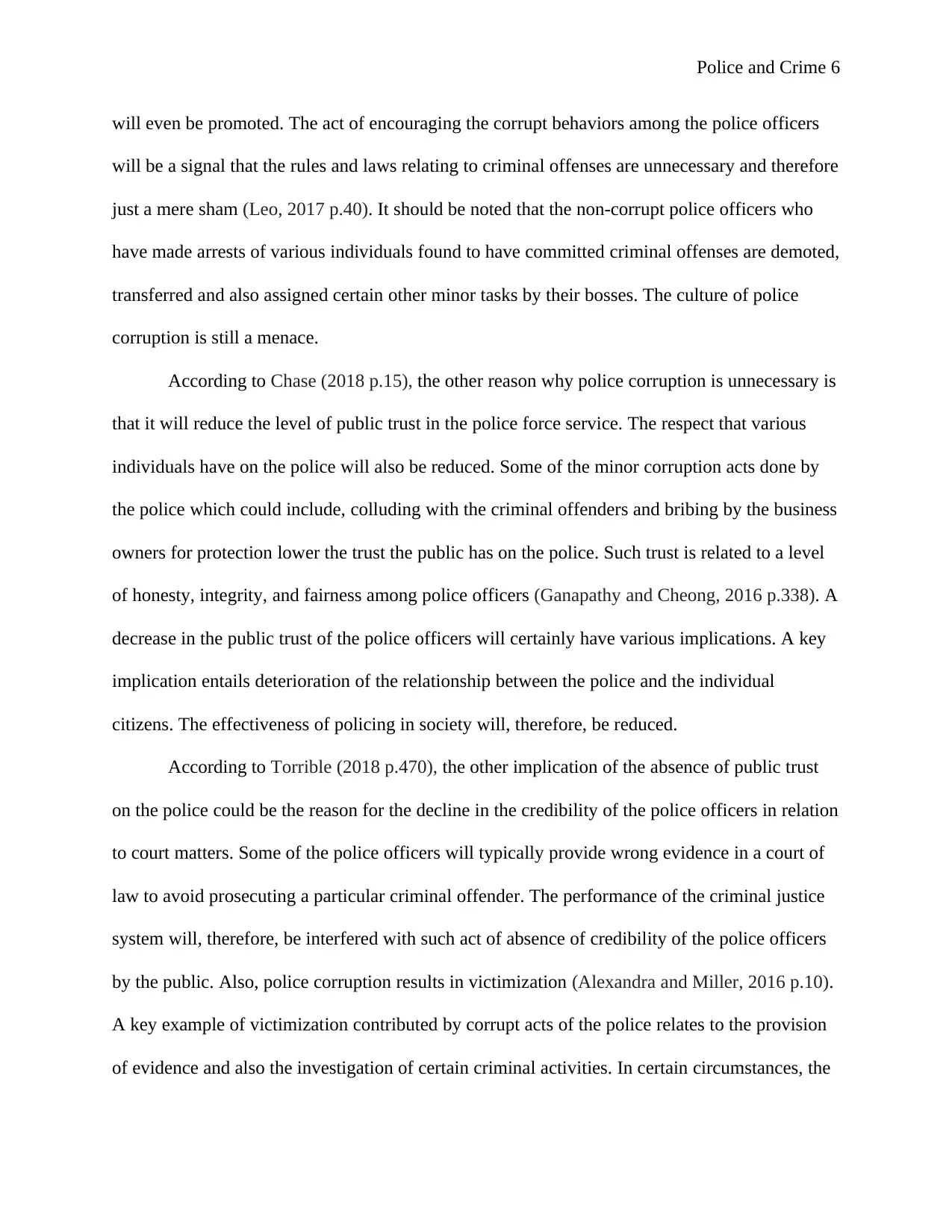
Police and Crime 6
will even be promoted. The act of encouraging the corrupt behaviors among the police officers
will be a signal that the rules and laws relating to criminal offenses are unnecessary and therefore
just a mere sham (Leo, 2017 p.40). It should be noted that the non-corrupt police officers who
have made arrests of various individuals found to have committed criminal offenses are demoted,
transferred and also assigned certain other minor tasks by their bosses. The culture of police
corruption is still a menace.
According to Chase (2018 p.15), the other reason why police corruption is unnecessary is
that it will reduce the level of public trust in the police force service. The respect that various
individuals have on the police will also be reduced. Some of the minor corruption acts done by
the police which could include, colluding with the criminal offenders and bribing by the business
owners for protection lower the trust the public has on the police. Such trust is related to a level
of honesty, integrity, and fairness among police officers (Ganapathy and Cheong, 2016 p.338). A
decrease in the public trust of the police officers will certainly have various implications. A key
implication entails deterioration of the relationship between the police and the individual
citizens. The effectiveness of policing in society will, therefore, be reduced.
According to Torrible (2018 p.470), the other implication of the absence of public trust
on the police could be the reason for the decline in the credibility of the police officers in relation
to court matters. Some of the police officers will typically provide wrong evidence in a court of
law to avoid prosecuting a particular criminal offender. The performance of the criminal justice
system will, therefore, be interfered with such act of absence of credibility of the police officers
by the public. Also, police corruption results in victimization (Alexandra and Miller, 2016 p.10).
A key example of victimization contributed by corrupt acts of the police relates to the provision
of evidence and also the investigation of certain criminal activities. In certain circumstances, the
will even be promoted. The act of encouraging the corrupt behaviors among the police officers
will be a signal that the rules and laws relating to criminal offenses are unnecessary and therefore
just a mere sham (Leo, 2017 p.40). It should be noted that the non-corrupt police officers who
have made arrests of various individuals found to have committed criminal offenses are demoted,
transferred and also assigned certain other minor tasks by their bosses. The culture of police
corruption is still a menace.
According to Chase (2018 p.15), the other reason why police corruption is unnecessary is
that it will reduce the level of public trust in the police force service. The respect that various
individuals have on the police will also be reduced. Some of the minor corruption acts done by
the police which could include, colluding with the criminal offenders and bribing by the business
owners for protection lower the trust the public has on the police. Such trust is related to a level
of honesty, integrity, and fairness among police officers (Ganapathy and Cheong, 2016 p.338). A
decrease in the public trust of the police officers will certainly have various implications. A key
implication entails deterioration of the relationship between the police and the individual
citizens. The effectiveness of policing in society will, therefore, be reduced.
According to Torrible (2018 p.470), the other implication of the absence of public trust
on the police could be the reason for the decline in the credibility of the police officers in relation
to court matters. Some of the police officers will typically provide wrong evidence in a court of
law to avoid prosecuting a particular criminal offender. The performance of the criminal justice
system will, therefore, be interfered with such act of absence of credibility of the police officers
by the public. Also, police corruption results in victimization (Alexandra and Miller, 2016 p.10).
A key example of victimization contributed by corrupt acts of the police relates to the provision
of evidence and also the investigation of certain criminal activities. In certain circumstances, the
⊘ This is a preview!⊘
Do you want full access?
Subscribe today to unlock all pages.

Trusted by 1+ million students worldwide
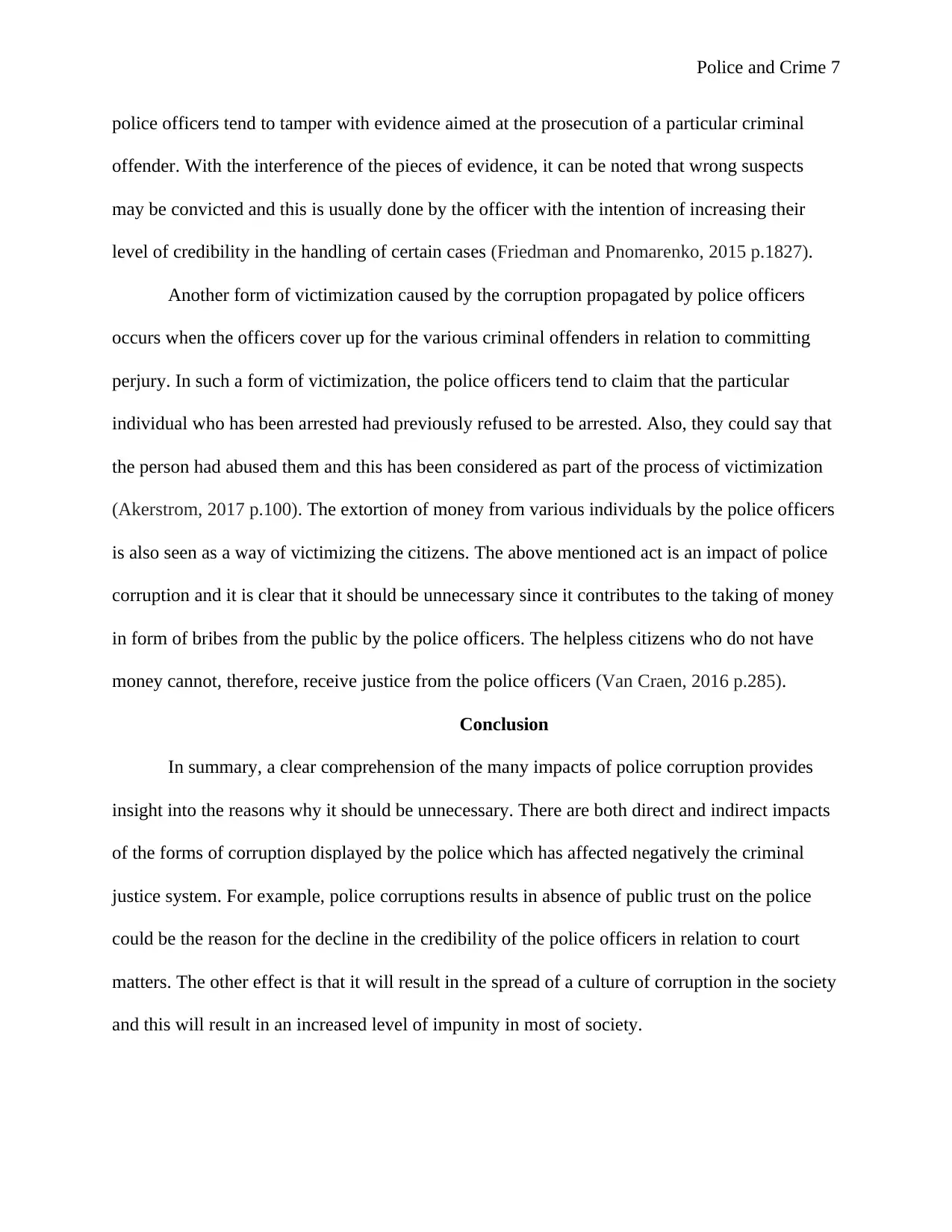
Police and Crime 7
police officers tend to tamper with evidence aimed at the prosecution of a particular criminal
offender. With the interference of the pieces of evidence, it can be noted that wrong suspects
may be convicted and this is usually done by the officer with the intention of increasing their
level of credibility in the handling of certain cases (Friedman and Pnomarenko, 2015 p.1827).
Another form of victimization caused by the corruption propagated by police officers
occurs when the officers cover up for the various criminal offenders in relation to committing
perjury. In such a form of victimization, the police officers tend to claim that the particular
individual who has been arrested had previously refused to be arrested. Also, they could say that
the person had abused them and this has been considered as part of the process of victimization
(Akerstrom, 2017 p.100). The extortion of money from various individuals by the police officers
is also seen as a way of victimizing the citizens. The above mentioned act is an impact of police
corruption and it is clear that it should be unnecessary since it contributes to the taking of money
in form of bribes from the public by the police officers. The helpless citizens who do not have
money cannot, therefore, receive justice from the police officers (Van Craen, 2016 p.285).
Conclusion
In summary, a clear comprehension of the many impacts of police corruption provides
insight into the reasons why it should be unnecessary. There are both direct and indirect impacts
of the forms of corruption displayed by the police which has affected negatively the criminal
justice system. For example, police corruptions results in absence of public trust on the police
could be the reason for the decline in the credibility of the police officers in relation to court
matters. The other effect is that it will result in the spread of a culture of corruption in the society
and this will result in an increased level of impunity in most of society.
police officers tend to tamper with evidence aimed at the prosecution of a particular criminal
offender. With the interference of the pieces of evidence, it can be noted that wrong suspects
may be convicted and this is usually done by the officer with the intention of increasing their
level of credibility in the handling of certain cases (Friedman and Pnomarenko, 2015 p.1827).
Another form of victimization caused by the corruption propagated by police officers
occurs when the officers cover up for the various criminal offenders in relation to committing
perjury. In such a form of victimization, the police officers tend to claim that the particular
individual who has been arrested had previously refused to be arrested. Also, they could say that
the person had abused them and this has been considered as part of the process of victimization
(Akerstrom, 2017 p.100). The extortion of money from various individuals by the police officers
is also seen as a way of victimizing the citizens. The above mentioned act is an impact of police
corruption and it is clear that it should be unnecessary since it contributes to the taking of money
in form of bribes from the public by the police officers. The helpless citizens who do not have
money cannot, therefore, receive justice from the police officers (Van Craen, 2016 p.285).
Conclusion
In summary, a clear comprehension of the many impacts of police corruption provides
insight into the reasons why it should be unnecessary. There are both direct and indirect impacts
of the forms of corruption displayed by the police which has affected negatively the criminal
justice system. For example, police corruptions results in absence of public trust on the police
could be the reason for the decline in the credibility of the police officers in relation to court
matters. The other effect is that it will result in the spread of a culture of corruption in the society
and this will result in an increased level of impunity in most of society.
Paraphrase This Document
Need a fresh take? Get an instant paraphrase of this document with our AI Paraphraser
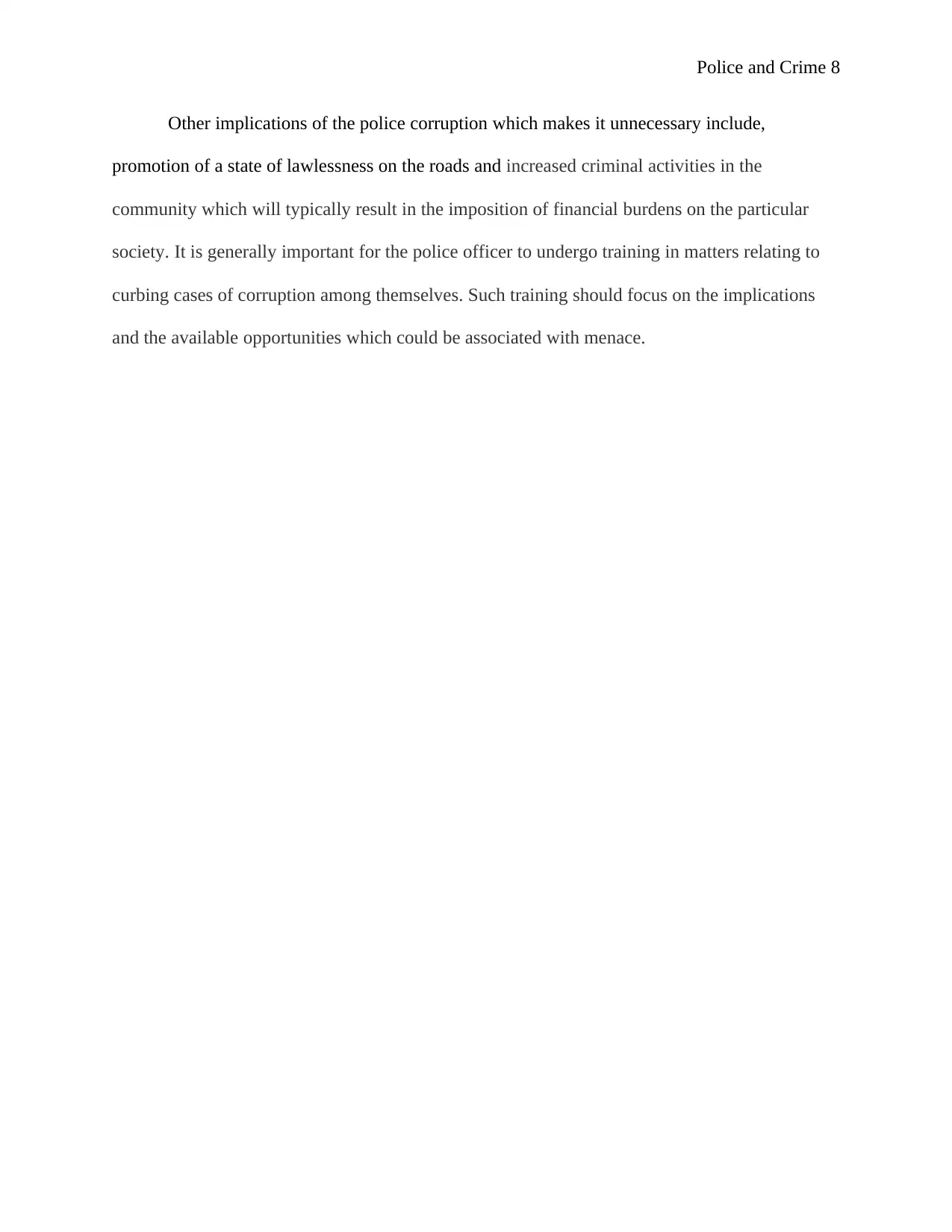
Police and Crime 8
Other implications of the police corruption which makes it unnecessary include,
promotion of a state of lawlessness on the roads and increased criminal activities in the
community which will typically result in the imposition of financial burdens on the particular
society. It is generally important for the police officer to undergo training in matters relating to
curbing cases of corruption among themselves. Such training should focus on the implications
and the available opportunities which could be associated with menace.
Other implications of the police corruption which makes it unnecessary include,
promotion of a state of lawlessness on the roads and increased criminal activities in the
community which will typically result in the imposition of financial burdens on the particular
society. It is generally important for the police officer to undergo training in matters relating to
curbing cases of corruption among themselves. Such training should focus on the implications
and the available opportunities which could be associated with menace.
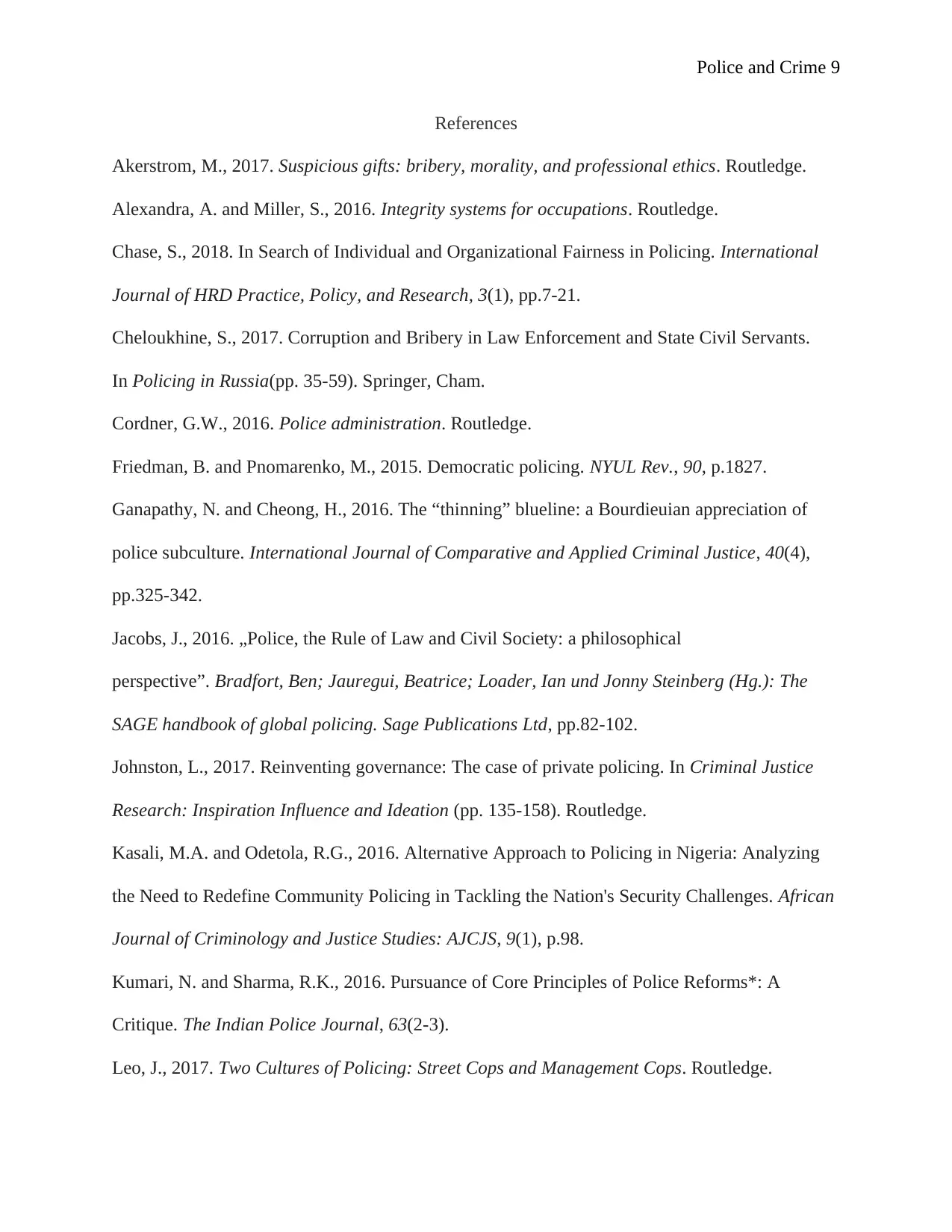
Police and Crime 9
References
Akerstrom, M., 2017. Suspicious gifts: bribery, morality, and professional ethics. Routledge.
Alexandra, A. and Miller, S., 2016. Integrity systems for occupations. Routledge.
Chase, S., 2018. In Search of Individual and Organizational Fairness in Policing. International
Journal of HRD Practice, Policy, and Research, 3(1), pp.7-21.
Cheloukhine, S., 2017. Corruption and Bribery in Law Enforcement and State Civil Servants.
In Policing in Russia(pp. 35-59). Springer, Cham.
Cordner, G.W., 2016. Police administration. Routledge.
Friedman, B. and Pnomarenko, M., 2015. Democratic policing. NYUL Rev., 90, p.1827.
Ganapathy, N. and Cheong, H., 2016. The “thinning” blueline: a Bourdieuian appreciation of
police subculture. International Journal of Comparative and Applied Criminal Justice, 40(4),
pp.325-342.
Jacobs, J., 2016. „Police, the Rule of Law and Civil Society: a philosophical
perspective”. Bradfort, Ben; Jauregui, Beatrice; Loader, Ian und Jonny Steinberg (Hg.): The
SAGE handbook of global policing. Sage Publications Ltd, pp.82-102.
Johnston, L., 2017. Reinventing governance: The case of private policing. In Criminal Justice
Research: Inspiration Influence and Ideation (pp. 135-158). Routledge.
Kasali, M.A. and Odetola, R.G., 2016. Alternative Approach to Policing in Nigeria: Analyzing
the Need to Redefine Community Policing in Tackling the Nation's Security Challenges. African
Journal of Criminology and Justice Studies: AJCJS, 9(1), p.98.
Kumari, N. and Sharma, R.K., 2016. Pursuance of Core Principles of Police Reforms*: A
Critique. The Indian Police Journal, 63(2-3).
Leo, J., 2017. Two Cultures of Policing: Street Cops and Management Cops. Routledge.
References
Akerstrom, M., 2017. Suspicious gifts: bribery, morality, and professional ethics. Routledge.
Alexandra, A. and Miller, S., 2016. Integrity systems for occupations. Routledge.
Chase, S., 2018. In Search of Individual and Organizational Fairness in Policing. International
Journal of HRD Practice, Policy, and Research, 3(1), pp.7-21.
Cheloukhine, S., 2017. Corruption and Bribery in Law Enforcement and State Civil Servants.
In Policing in Russia(pp. 35-59). Springer, Cham.
Cordner, G.W., 2016. Police administration. Routledge.
Friedman, B. and Pnomarenko, M., 2015. Democratic policing. NYUL Rev., 90, p.1827.
Ganapathy, N. and Cheong, H., 2016. The “thinning” blueline: a Bourdieuian appreciation of
police subculture. International Journal of Comparative and Applied Criminal Justice, 40(4),
pp.325-342.
Jacobs, J., 2016. „Police, the Rule of Law and Civil Society: a philosophical
perspective”. Bradfort, Ben; Jauregui, Beatrice; Loader, Ian und Jonny Steinberg (Hg.): The
SAGE handbook of global policing. Sage Publications Ltd, pp.82-102.
Johnston, L., 2017. Reinventing governance: The case of private policing. In Criminal Justice
Research: Inspiration Influence and Ideation (pp. 135-158). Routledge.
Kasali, M.A. and Odetola, R.G., 2016. Alternative Approach to Policing in Nigeria: Analyzing
the Need to Redefine Community Policing in Tackling the Nation's Security Challenges. African
Journal of Criminology and Justice Studies: AJCJS, 9(1), p.98.
Kumari, N. and Sharma, R.K., 2016. Pursuance of Core Principles of Police Reforms*: A
Critique. The Indian Police Journal, 63(2-3).
Leo, J., 2017. Two Cultures of Policing: Street Cops and Management Cops. Routledge.
⊘ This is a preview!⊘
Do you want full access?
Subscribe today to unlock all pages.

Trusted by 1+ million students worldwide

Police and Crime 10
Lord, N., 2016. Regulating corporate bribery in international business: Anti-corruption in the
UK and Germany. Routledge.
Makin, D.A. and Marenin, O., 2017. Let’s dance: variations of partnerships in community
policing. Policing: A Journal of Policy and Practice, 11(4), pp.421-436.
Metcalf, B., 2017. New police management, performance and accountability. In Questioning the
New Public Management(pp. 71-88). Routledge.
O’Hara, P. and A. Sainato, V., 2015. Monetizing the police: Corruption vectors in agency-
managed off-duty work. Policy and Society, 34(2), pp.151-164.
Stoughton, S.W., 2016. Principled policing: Warrior cops and guardian officers. Wake Forest L.
Rev., 51, p.611.
Talvitie, A., 2017. Observed differences in corruption between Asia and Africa: the industrial
organization of corruption and its cure. Transportation research procedia, 25, pp.4472-4490.
Torrible, C., 2018. Reconceptualizing the police complaints process as a site of contested
legitimacy claims. Policing and Society, 28(4), pp.464-479.
Van Craen, M., 2016. Understanding police officers’ trust and trustworthy behavior: A work
relations framework. European journal of criminology, 13(2), pp.274-294.
Lord, N., 2016. Regulating corporate bribery in international business: Anti-corruption in the
UK and Germany. Routledge.
Makin, D.A. and Marenin, O., 2017. Let’s dance: variations of partnerships in community
policing. Policing: A Journal of Policy and Practice, 11(4), pp.421-436.
Metcalf, B., 2017. New police management, performance and accountability. In Questioning the
New Public Management(pp. 71-88). Routledge.
O’Hara, P. and A. Sainato, V., 2015. Monetizing the police: Corruption vectors in agency-
managed off-duty work. Policy and Society, 34(2), pp.151-164.
Stoughton, S.W., 2016. Principled policing: Warrior cops and guardian officers. Wake Forest L.
Rev., 51, p.611.
Talvitie, A., 2017. Observed differences in corruption between Asia and Africa: the industrial
organization of corruption and its cure. Transportation research procedia, 25, pp.4472-4490.
Torrible, C., 2018. Reconceptualizing the police complaints process as a site of contested
legitimacy claims. Policing and Society, 28(4), pp.464-479.
Van Craen, M., 2016. Understanding police officers’ trust and trustworthy behavior: A work
relations framework. European journal of criminology, 13(2), pp.274-294.
1 out of 10
Related Documents
Your All-in-One AI-Powered Toolkit for Academic Success.
+13062052269
info@desklib.com
Available 24*7 on WhatsApp / Email
![[object Object]](/_next/static/media/star-bottom.7253800d.svg)
Unlock your academic potential
Copyright © 2020–2026 A2Z Services. All Rights Reserved. Developed and managed by ZUCOL.





